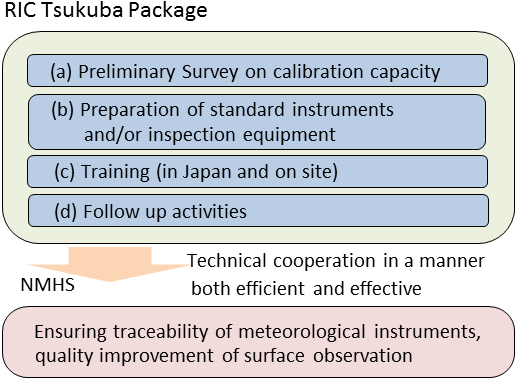Workshop observation and surveying of meteorological instrument calibration highlighted a need for training in a number of countries to enhance instrument calibration/maintenance capacity and support the establishment of links between national meteorological standards and superordinate standards traceable to international standards. Based on such practical needs, RIC Tsukuba developed the RIC Tsukuba Package as a comprehensive support approach encompassing the calibration of national standard instruments, the transfer of calibration technology and the preparation of instruments for national standards where necessary.
The RIC Tsukuba Package addresses the challenges of establishing international traceability for meteorological instruments and maintaining a related framework in partner countries.
The package has been incorporated into Japan International Cooperation Agency (JICA) technical projects conducted in Bangladesh, Fiji, Mozambique and Sri Lanka. Through the overall process of the package, JICA plays a substantial role as a partner developing a firm framework and fulfilling various bilateral coordination functions in such technical cooperation projects.
1. RIC Tsukuba Package components
The RIC Tsukuba Package is intended to support the establishment of international traceability for meteorological instruments and capacity building. The package incorporates four components (figure below):
(a) On-site surveying in relation to calibration capacity
On-site surveying is conducted in a partner country by experts dispatched from RIC Tsukuba to clarify
- the status of standard instruments and inspection equipment.
- the traceability framework for individual meteorological instruments.
- calibration technique capacity, as well as to enable the development of efficient cooperation plans.
(b) Preparation of national meteorological standard instruments
Based on the results of on-site surveying, JMA experts identify necessary equipment (e.g., standard instruments and/or inspection equipment) for the partner country. For JICA technical cooperation projects, JMA advises JICA on any necessary provision of such equipment to the partner country.
(c) Technical training in Japan and NMHSs countries
Once a decision on the preparation of necessary equipment has been made, technical staff from NMHS in the partner country are invited to RIC Tsukuba, which then provides training (i.e., presentations and practical application) on calibration techniques using the same standard instruments/equipment to be used by the partner country. The training includes a presentation to help technical staff understand the fundamental concept and the importance of the framework for international traceability regarding meteorological instruments. RIC Tsukuba experts subsequently visit the NMHS in the partner country, checking the calibration capacity of technical staff and providing additional training as necessary.
(d) Follow-up activities
After the training, RIC Tsukuba conducts ongoing follow-up with technical advice based on the results of calibration conducted by technical staff of the NMHS in the beneficiary country. This ensures that the country will maintain its calibration capacity and promotes the achievement of international traceability.

Outline of the RIC Tsukuba Package

